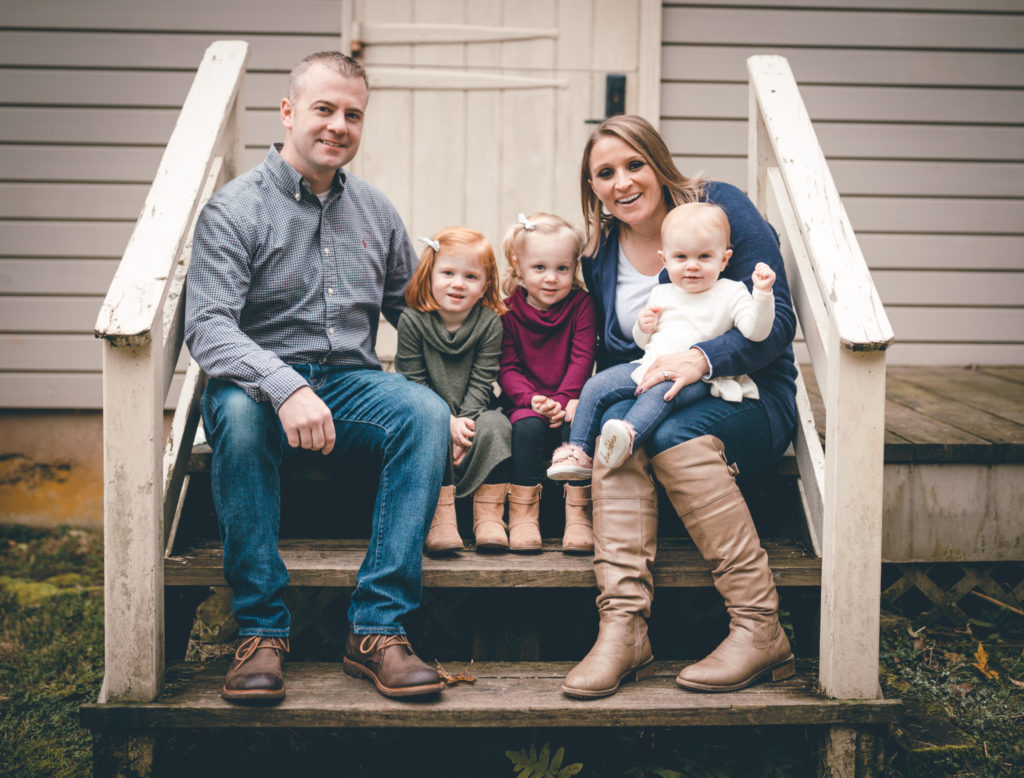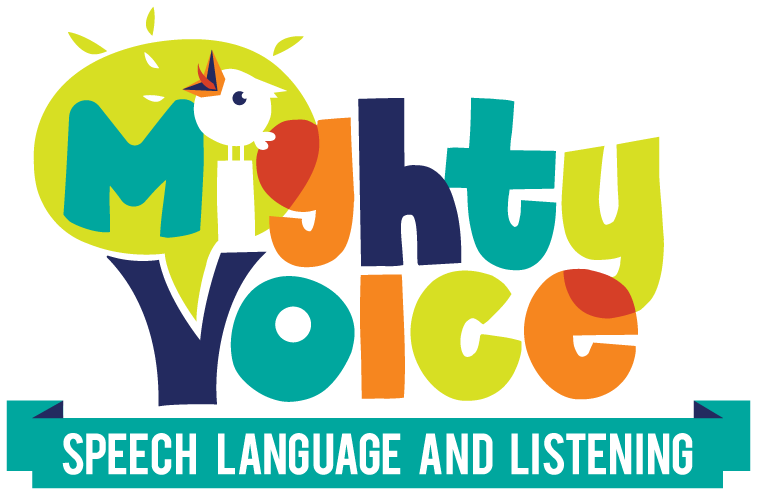Hello Mighty Voice Readers! I am so excited to share today’s interview with you. Theresa from Sound Speech is not only a certified auditory verbal therapist, but she is also a hearing consultant for the state of New Jersey, and, she’s my mentor in my journey to certification as a listening and spoken language specialist/auditory verbal therapist.
I originally heard about Theresa when she was interviewed on the All Ears podcast about her role counseling families who are newly diagnosed with hearing loss. I’m so excited for readers to hear her perspectives. -Bridget

I first found out about you from the Child’s Voice podcast about your role as a hearing consultant. Can you talk a little about what that job is all about, and what’s unique or interesting for you about it?
In NJ early intervention, we are lucky enough to have a grant funded position called the hearing consultant. There are two of us, myself and a TOD/AVT, who cover the state. We’ve had this position in place for about eight years or so and are hopeful that we will have the funding to continue for many more years to come.
Essentially, the role of the hearing consultant was created to offer families comprehensive, unbiased information about all things related to hearing loss, including communication modalities, state and national resources, understanding the child’s diagnosis, how to read an audiogram, how to obtain hearing technology, how to learn American Sign Language, how to maximize the listening environment, etc.
The program is designed to allow for two conversations with families of children with hearing loss who are part of the early intervention system. When a family first enters early intervention, a referral is sent to the hearing consultant. Depending on geography, either myself or my counterpart will be assigned to the case. We then contact the family directly to explain our role and schedule an initial phone conversation with them.
That conversation may cover any of the following: questions or concerns they have, review some basic information about their child’ s hearing loss, discuss the different ways children with hearing loss may communicate, and provide them with resources about hearing loss. Sometimes it’s a 90-minute conversation, sometimes is a 15-minute conversation. It’s all about meeting the parents where they’re at and providing them with as much or as little information as they indicate they’re ready to hear.
A few weeks later, we have a follow up conversation with the family and their early intervention service coordinator, where we go in a bit more detail about strategies the family can use at home to help with language and listening development, if appropriate. In an ideal world, I’d love to be able to stay in contact with families over time.
Because the referral to the hearing consultant happens so quickly, some families haven’t even had time yet to process the information they’ve been given. They may be grieving. They may not even know what questions to ask yet. And of course, as children get older there are new challenges that families face, which can lead to new concerns and questions. Perhaps someday we will have enough funding to allow for increased contact with families—fingers crossed!
Personally, I love this position because it involves interacting with the parents. I love being able to partner with families to hopefully make what is a very overwhelming season in their lives feel a little bit more manageable. I only wish that we were able to do it on a more long-term basis.
In your role as a hearing consultant you talk to parents who have just found out about their child’s diagnosis. What advice would you give to families who have just found out their child is deaf?
This is a great question. I would like families to know that everything is going to be ok. Of course, no one has a crystal ball to predict what life will be like in 5 or 10 years, and there certainly is a range of outcomes for children with hearing loss…but the same can be said for children with typical hearing as well!
This may not be what their family envisioned while they were planning their family and awaiting the birth of their child, but this will get easier. I heard a parent comment once, “My son is the first deaf person I ever met.” That really resonated with me.
I would strongly encourage them to connect with other parents of children with hearing loss and to try and keep an open mind about the amazing things their child can do!
In addition to providing therapy in private practice, you also mentor people working toward certification as AVTs or AVEDs (like me!) Can you describe what that process is like, and why you choose to do it?
This is a more recent interest of mine, something I’ve started doing in the last couple of years. There is SUCH a shortage of professionals with knowledge and expertise in hearing loss and I love supporting professionals who have an interest in this population. I feel like it’s one small way that I can have a greater impact on the field.
I love working with families, but I also love collaborating with professionals, and mentoring other LSLS candidates is one way to tap into that. I strongly believe that one of the best ways to learn is through teaching, and I have definitely learned a lot from mentoring. It helps keep me up-to-date with best research and practice, and holds me accountable for practicing all that I teach!
I think one of the myths some people believe about auditory verbal therapy is that auditory verbal therapists are absolutely against sign language. But, you are an auditory verbal therapist, and also offer American Sign Language instruction. Can you talk about that a little more, and how the two can coexist?
The division between spoken English and American Sign Language seems to be especially strong these days, or at least that is my perception. It is a topic that people have some very strong opinions about. I’m sure you’ve heard the term “language deprivation” being tossed around too.
Historically, I believe that auditory verbal therapy was much more prohibitive when it came to the use of sign language. Over time though, I do believe that the profession as a whole has evolved. Language is language! To me, it doesn’t much matter what language the child is getting as long as he is getting access to a strong language model.
When considering this topic, I think there are a few important factors to keep in mind. The technology from 30, 20, even just 10 years ago has changed drastically. The amount of access to sound that deaf adults with cochlear implants received in the 90s is very different than the amount of access to sound that children who are currently being fitted with cochlear implants have.
While I firmly believe in the importance of listening to deaf adults and their experiences growing up, I also think that some aspects of their experience were shaped by differences in technology. When it comes to technology and auditory access, comparing someone’s experience from 20 years ago to someone’s experience today is sort of like comparing apples to oranges.
Many within the deaf and hard of hearing field (both professionals and non-professionals alike) have strongly advocated for the use of sign language with ALL children with hearing loss. This would be amazing! Sign language is such a beautiful language and because it is a visual language, in theory it would be accessible to all deaf and hard of hearing children from birth. How cool is that??
However, the challenge with this approach is practicality. 92% of children with hearing loss are born to parents with typical hearing who have absolutely no knowledge or experience in ASL. They are trying to navigate an unfamiliar path and to expect them to learn a new language on top of that may not always be realistic.
Do I think it is important that newborns with hearing loss have immediate access to language? YES! The brain is rapidly developing during the first few years of life, especially during the first 12 months, and it’s critical to provide as much language input as possible during this time. Do I think it’s possible for babies who don’t have auditory access or exposure to American Sign Language (ASL) during the first 12 months of life to catch up to their hearing peers? YES! Does it always work out this way? NO! My point is that families need to be committed to providing their children with access to language the quickest way possible.
If they are not going to introduce ASL, then they need to ensure that their child has adequate access to spoken language. If they are not going to fit their child with hearing aids or cochlear implants, then they need to introduce ASL.
My opinion is that the decision on communication modalities should be made by the family, not by the professionals. I know there are people out there who would argue with me about this, and that’s ok.
I think it’s so important that we as a community can have open, respectful conversations with one another sharing our beliefs and opinions without becoming contentious. I do not believe there is a “one size fits all” model for serving children with hearing loss, and I do my best to present information and answer questions with as little bias as possible.
